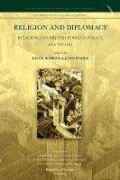As the editors of this largely interesting and informative collection of essays remind us in their introduction, religion has recently assumed fresh importance for practitioners (as well as students) of international relations. That importance assumed new heights after September 2001, and it shows no sign of diminishing. It is good therefore to have an informed historical perspective on the role of religion in diplomacy, notwithstanding this book’s focus on a fairly specific historical topic: issues pertaining to British foreign policy between 1815 and 1955 (rather than 1941).
The book’s contributors cover a range of issues, ranging from British church (and church leaders’) attitudes to foreign policy to the intricacies of British diplomatic dealings with Christian and non-Christian states. At their best, the contributors provide useful insight into the ways in which official attitudes to religion might feed into a country’s diplomacy. This might be more evident in countries other than the United Kingdom. As Hamish Ion notes, Japan’s diplomats took religion seriously. «The Japanese saw its use in the service of the state as vital to the inculcation of values of loyalty and patriotism among the general population. Christianity, a Western religion, was seen largely as a barrier to the achievement of this...» (p. 154). Yet for not dissimilar reasons, British statesmen and diplomats, cognisant of the difficulties caused by religion in, say, India had to be aware of the potential for diplomatic friction that might ensue from the overseas activities of Christian missionaries (161–162). The acquisition by Britain of useful and up-to-date knowledge about foreign countries was vital: in relation to Japan that knowledge came slowly enough, even after the 1860s. And as Ion emphasises, British policy towards Japan was sometimes based upon incomplete and even partial information (173–176).
The reverse might also be true; Japan may have over-emphasised the importance of Christianity in British (and European) life. Nevertheless, an interest in (if not always a commitment to) religious toleration, and awareness of the historically close connections between established church, crown and legislature helped keep British political leaders and diplomats mindful of the status of Christian and other religious communities in foreign countries. The question of religious freedom for minorities constituted a sometimes important aspect of relations between Britain and several other states, most notably the Ottoman Empire – here the subject of two chapters. As John Charmley shows (74 –79), official British attitudes towards the Turks and their religion were nothing if not fluid, and subject primarily to geopolitical preoccupation and expediency, not least with regard to Russia’s relations with the Porte. Turkish violence towards Christians (whether Greeks, Bulgarians or Armenians) aroused periodic concern in Britain and other western countries, and meant that Whitehall was sure to be subjected to lobbying by representatives of the churches and other religious agencies. Given its possible implications for Britain’s empire (with its huge Muslim populations), the future of the Caliphate became the subject of much official discussion during and after the First World War, as Erik Goldstein notes (99–101).
How much influence might British church leaders have exerted on foreign policy? Andrew Chandler examines the archiepiscopacy of Cosmo Gordon Lang between 1928 and 1939, concluding that in his contribution to debate on international relations Lang while far from successful did what he could, to the best of his abilities (221–222). Lang also features in John Fisher’s chapter on the complex history of the Church of England and Assyrian Christians during the period 1914–55. It nevertheless remains difficult to ascertain the full effect of religion on British foreign policy. Much more likely, as Michael Hughes suggests in a chapter on «nonconformity and foreign policy», is that international (or imperial) affairs had a notable impact on the churches in Britain. The Boer War, the First World War and appeasement all resonated strongly, stimulating debate and disagreement, notably within and between the various nonconformist churches. (As Eitan Bar-Josef has noted in The Holy Land and English Culture, 1799–1917 (Oxford: Oxford University Press, 2005), the influence of religion might take very varied form indeed.)
Two chapters, featuring attention to Jewish and Roman Catholic affairs, by T.G. Otte and Saho Matsumoto-Best respectively, remind us of other foreign policy complexities, although Otte’s focus is international rather than mainly British. Matsumoto-Best neatly connects (through the diplomatic activities of Odo Russell) the «Irish Question», Italian nationalism and Britain’s relations with the Vatican.
Notwithstanding the book’s theme, this is a diverse collection of essays. Understandably, it does not attempt to provide definitive assessment as to the importance of religion in British foreign policy. Matters of religious controversy might assume «international» status only on occasion during the period covered here, and even then be considered important mainly by religious rather than political leaders. Religion might be one of many factors in official relations with, say, Russia, or the Ottoman Empire. The focus here is primarily upon diplomatic history. This has certain advantages. But it also means less focus on the cultural aspects of religion. Charmley’s comments on Said’s Orientalism (61–64) stand out, partly for this reason. And might it have been the case that certain British secularists, freethinkers and atheists had notable views (even if little influence) on foreign affairs? There are lots of possibilities to explore. As the editors acknowledge, they are keen to open and sustain dialogue between the fields of «religious history» and «diplomatic history». That is surely a worthwhile aim.
Zitierweise:
John Stuart: Rezension zu: Keith Robbins/John Fisher (Hg.), Religion and Diplomacy. Religion and British Foreign Policy 1815 to 1941, Dordrecht, Republic of Letters, 2010. Zuerst erschienen in: Schweizerische Zeitschrift für Religions- und Kulturgeschichte, Vol. 104, 2010, S. 523-525
